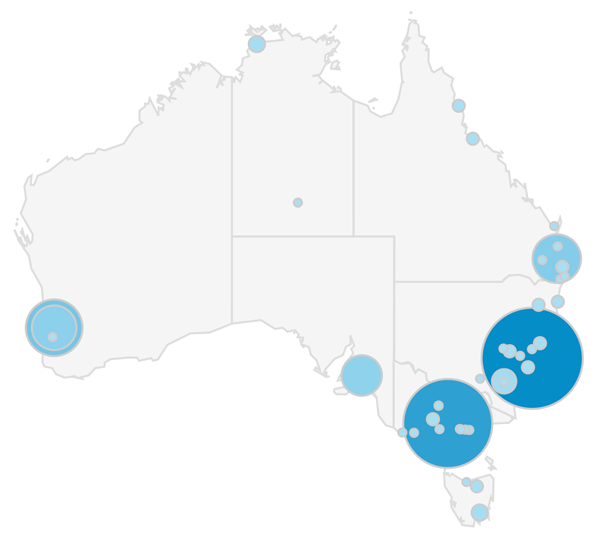Researching in the land down under
26 February 2016
Over the last few months we have seen more growth from Australian universities and so we decided to catch up with some of the researchers from the land down under to see how they are doing and why Call for Participants has worked for them.

Web traffic from different Australian cities
Some of our heaviest usage from of Australian universities comes from Charles Sturt University and Deakin University. Like many others, Dr. Dani Sulikowski, lecturer in School of Psychology and founder of the Comparative cognition Laboratory at Charles Sturt University said she came across Call for Participants from a need to find more participants:
"I was actively seeking out as many ways as possible for recruiting participants online"
She was one of the first Australian researchers to try the service back in 2014, when we were only starting out. We now have researchers from 24 different universities across Australia and as an expanding market they show some of the highest recruitment rates of any universities. For example, on average University of Melbourne has recruited over 200 participants per published study and University of Western Australia an even higher 300 participants.
-
Australian Universities
24
Number of researchers from different Australian universities
-
Traffic from New South Wales
36.67%
Over a third of all website traffic from Australia comes from New South Wales
-
Participants per study
Over 300
Number of participants recruited per study by researchers from University of Western Australia
-
Views per study
252
Average number of views per research study from Australia
We caught up with Claire Mitchell, one of our researchers from University of Western Australia, who studies unusual visual experiences and hallucinations at the School of Psychology, to learn more about her experiences and here's what she had to say:
"Call for Participants has been absolutely great for my research:
- Professional looking landing page which provides study information in a concise and visually-appealing way
- Using the webpage for recruitment of people who have visited the website as a participant, and also to recruit people from other websites by providing the link to the Call for Participants page
- Allowing access to participants worldwide which helps make my sample diverse
- Great to have a website that is purely dedicated to recruiting participants for academic research, rather than a business-type platform
- Free!
- Also interesting to see what other universities are researching!"
Claire Mitchell
But naturally, Call for Participants isn't only for pshychology studies. Jessica Frawley is finishing her PhD studies in multimodal literacies and participatory processes in design at the Centre for Human Centred Technology and Design, University of Technology Sydney, and found Call for Participants helpful in her work:
"I am using the site to promote my study and have found it really helpful. The actual idea of the site is great and it has been a god send for actually recruiting participants! Thanks enormously for all the great stuff you do."
No, Jessica, thank you for all the great stuff YOU do - researchers from Australia happen to be some of the most generous in the world, frequently offering over $100 gift cards and other high-paying rewards to participants for their time. So why not take part in some Australian studies right now:
-

Public Perceptions of Grief Survey
Curtin University of Technology, AU
Curtin University invites you to participate in an important piece of research exploring community responses to grief and bereavement. If you choose to participate, we will ask you to complete a single online questionnaire that will take approximately 15-20 minutes. Anyone aged over 18 years who is currently residing in Australia may participate. In recognition of your time, you will be invited to enter an optional prize draw to win one of four $50 Amazon or iTunes giftcards.
- 15 min(s) to complete
- Prize draw for one of four $50 Amazon or iTunes gift cards
- Online Questionnaire
- Online
16 February 2016 Requirements- Age 18 years or over
- Residents of Australia
- May be bereaved or non-bereaved
-

Worldviews, Cognition, and Well-Being
Swinburne University of Technology, AU
The main aim of this study is to investigate how different worldview belief systems relate to different thinking styles and various aspects of well-being. This research has applications for psychological practice, particularly for therapies relating to core beliefs.
- 30 min(s) to complete
- Prize Draw $250
- Online Questionnaire
- Online
17 February 2016 Requirements- Anyone over 18 years.
Our experiences with Australian researchers and their experiences with the site go to show that academics face the same problems all over the world. By building a global community of researchers and people interested in contributing to research, we can overcome these and make conducting research easier for everyone.
